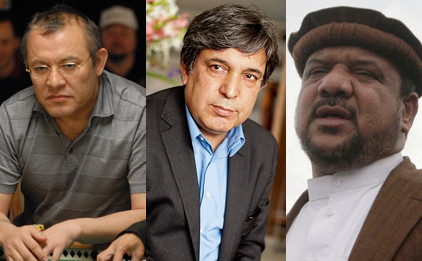By Abasin Zaheer & Abdul Qadir Siddiqui
Governor of Da Afghanistan Bank Abdul Qadir Fitrat on Wednesday named some of Kabul Bank shareholders who were allegedly involved in misusing clients' deposits.
Despite risks, the stakeholders were named to resolve the crisis, Fitrat told the Wolesi Jirga -- the lower house of the Parliament, which summoned him to explain the story of Afghanistan's largest private bank.

Sher Khan Farnood (left), Mahmood Karzai (center) and Mohammad Hussain Fahim, brother of the current vice president Qaseem Fahim (right), misused customers' deposits. Last year, reports appeared in the media about the bank losing $300 million (13.656 billion afghanis) due to mismanagement, cronyism and dubious lending.
Sher Khan Farnood, Khalil Ferozi, Mohammad Hussain Fahim, Mahmood Karzai, Gulbahar Habibi, Abdul Ghafar Dawi, Mohammad Ibrahim, Sofi Nisar, Tahir Zahir, Daud Nasim violated Article 34 of the banking law by misusing customers' deposits.
Last year, reports appeared in the media about the bank losing $300 million (13.656 billion afghanis) due to mismanagement, cronyism and dubious lending. Subsequently, two senior shareholders were removed and the government took the bank's control.
After the multi-million dollar scandal broke in September 2010, the central bank abruptly took control of Kabul Bank and injected hundreds of millions of dollars to keep it afloat.
On April 20, a safe portion of the nation's biggest lender was taken over by the Department of Treasury at the Ministry of Finance. In September 2010, US intelligence officials sent the central bank a report, saying shareholders had bought some property in United Arab Emirates, Fitrat said.
Kabul Bank shareholders had also invested in Pamir Airways, Gas Group, Kabul Mine Companies and Gulbahar Towers, the top banker alleged, adding they were removed and the bank taken over to prevent its collapse.
Fitrat said he had requested the government to set up a special court to try the banking law violators publicly and confiscate their property. Most of them had confessed to misuse clients' money, he claimed.
Without giving details, he said assets of some of the bank stakeholders had been frozen and travel restrictions imposed on them. Kabul Bank's new Governor Massoud Ghazi was also present during Wednesday's session.
Farnod had fraudulently received in loan $504 million Ferozi $66.9m, Fahim $78m, Mahmood Karzai $22m Habibi $39.7m, Dawi $37m, Ibrahim $9m, Sofi Nisar $14m and Zahir $11m, Ghazi informed lawmakers.
An amount of $49 million has been recovered from them, according to Ghazi, who said $450m loans were based on guarantees.
According to a list issued by a government-appointed commission to deal with the crisis, the loanees include political figures and private companies. A process of settlement had been set in motion, Ghazi continued.
About 200 people are said to have received loans from the private bank. Parliamentarian Shukriya Barakzai said 103 out of the 200 defaulters, included MPs and cabinet members. She insisted names of all loanees be revealed.
"All the parliamentarians are with you and support your bold step of naming the shareholders," MP Sher Wali Wardak told Fitrat.
Other lawmakers, Ramazan Bashardost and Mohammad Naeem Lali, accused Fitrat of being part of the Kabul Bank problem.
"You have been dictated to name the shareholders. Don't worry; they won't kill you because you are a milk cow for them. No one slaughters a milk cow," Bashardost remarked.
His remarks angered some parliamentarians, who asked the chairman to deal with the MP according to the parliamentary conduct of code. Later, Bashardost was taken out of the house.



